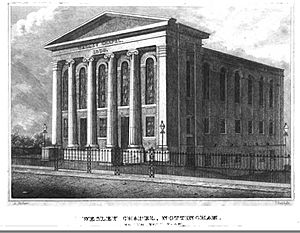Broad Street Wesleyan Church facts for kids
Quick facts for kids Broad Street Wesleyan Chapel |
|
|---|---|

Broad Street Wesleyan Chapel from the History and Antiquities of Nottingham. James Orange. 1840.
|
|
| 52°57′18″N 1°08′42″W / 52.955108°N 1.144958°W | |
| Location | Nottingham |
| Country | England |
| Denomination | Wesleyan Methodist |
| Architecture | |
| Architect(s) | Samuel Sutton Rawlinson |
| Completed | 1839 |
| Construction cost | £9,000 |
| Specifications | |
| Length | 97.6 feet (29.7 m) |
| Width | 64 feet (20 m) |
The Broad Street Wesleyan Chapel was a Methodist church building in Nottingham, England. It was open from 1839 until 1954. Today, the building is home to the Broadway Cinema.
Contents
History of the Chapel
The Broad Street Wesleyan Chapel was built in 1839. Its architect was S. S. Rawlinson. The chapel was very large, with space for 1,920 people to sit. It also had a school room for 400 children. Building the chapel cost £9,000, which was a lot of money back then. This amount would be worth much more today.
The chapel officially opened on June 20, 1839. On its opening day, the collections from visitors raised £1,870.
Important Events and People
In 1844, a famous preacher named Rev. James Caughey visited the chapel. It is believed that during his visit, William Booth became a Christian there. William Booth later went on to found the Salvation Army, a well-known Christian organization.
By 1947, the chapel needed a new roof, which would have been very expensive. Also, fewer people were attending services. Because of these reasons, the chapel closed its doors in 1954.
From Chapel to Cinema
After the chapel closed, the building was bought by the Nottingham Cooperative Society. They wanted to use it as an Educational Centre. In 1959, the Co-operative Educational Centre opened, working with the Nottingham and District Film Society.
Over time, this center became a place supported by the British Film Institute. Eventually, it transformed into the Broadway Cinema, which is still a popular cinema today.
The Chapel Organ
When the Broad Street Wesleyan Chapel first opened, it had a second-hand organ. This organ was bought from a person named Mr. Ward in York.
Later, in 1909, a new organ was installed. This new organ was made by a company called Norman and Beard. The 1909 organ was later given to the University of Nottingham. You can still find it in the Great Hall at the university. Details about this organ are available in the National Pipe Organ Register.
Organists at the Chapel
Several talented musicians played the organ at the Broad Street Wesleyan Chapel:
- George Middleton (who used to be the organist at Emmanuel Church, Nottingham)
- William Vivian Todd (from 1948 onwards)

